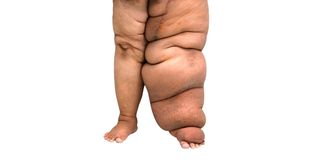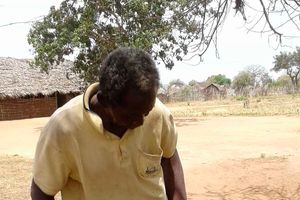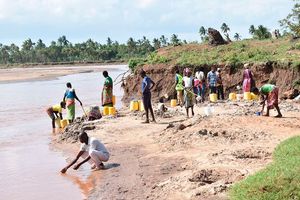
Elephantiasis, also known as lymphatic filariasis (LF), is a neglected tropical disease caused by parasitic roundworms.
In the quiet village of Gesere in Nyaribari Chache, Kisii County, 85-year-old Norah Kemunto Obonyo is the embodiment of a mother's unwavering strength.
Her life has been a journey of love, loss and endurance, shaped by the mysterious illness that has affected six of her nine children.
The disease, believed to be lymphatic filariasis — commonly known as elephantiasis — first manifested when each of the affected children reached Standard Seven.
Their legs and toes began to swell dramatically, making movement painful and everyday life difficult.
Despite seeking medical treatment and traditional remedies, relief remained elusive.
“Our children’s legs started swelling suddenly, and we tried everything, hospitals, herbs, prayers; but nothing worked,” said Ms Kemunto, seated in her modest home in Ibeno Ward.
The condition halted her children’s education and cast a long shadow over their lives.
Fear and misunderstanding caused some in the community to withdraw, but Ms Kemunto and her family chose to face adversity with quiet courage.
“People didn’t understand what was happening. Some thought we were cursed. But we kept praying. We never lost hope that healing would eventually come,” she said.

In Kenya, elephantiasis is endemic in several regions, particularly in coastal areas and parts of the Rift Valley.
Kemunto's family's story was first published in the Daily Nation in 2021.
At the time, her husband was still alive and was a pillar of strength, selling everything he owned, including livestock, to care for their children.
However, the emotional toll proved too great.
He passed away a year later.
“He tried everything to help. When nothing worked and all our savings were gone, he lost hope. He fell ill and never recovered. We weren’t affected by the illness ourselves, and we often asked why our children were,” Ms Kemunto reflected.
When Nation.Africa recently visited the family, Ms Kemunto was at home with two of her affected children – Jeneva, aged 60, and Geoffrey, who had just turned 49.
Initially reluctant to be seen, Jeneva opened up after some encouragement from her mother.
“So many people have come and taken our photos, but help has rarely followed. Still, we believe God will open a path for us. We are holding on to that hope,” she said softly.
“I have suffered greatly. The swelling brings pain and itching. But we’re not giving up. If there’s anyone who can help us get treatment, please come forward.”
Her brother Geoffrey, a father of three, soon joined the conversation.
“This disease has left us unable to work or earn a living. We’ve spent everything on treatment, but the condition remains. Still, we trust in God’s timing,” he said.

A roundworm nematode, one of the causative agents of lymphatic filariasis (elephantiasis).
He praised his mother for doing everything she could to help them.
"We rely on her. Though she’s aging, she continues to carry this burden with grace. We worry about what will happen when she’s no longer here,” Geoffrey explained.
Three of Kemunto’s children who were affected by the disease now live in Nairobi, having been taken in by well-wishers who hoped to find them better medical care. While the disease has not yet been cured, they remain connected through frequent phone calls.
Despite the many challenges, Kemunto has found solace in her church community and in a few steadfast friends who offer her emotional and material support.
“My church has been a pillar for me. Some friends have also stepped in to help. In church, they now call me Naomi, like the biblical figure, because of the trials I’ve faced. But also because I’ve never stopped believing in better days,” she said, her eyes reflecting both weariness and warmth.
Kemunto’s greatest wish is simple – to see her children regain their health and live with dignity.







